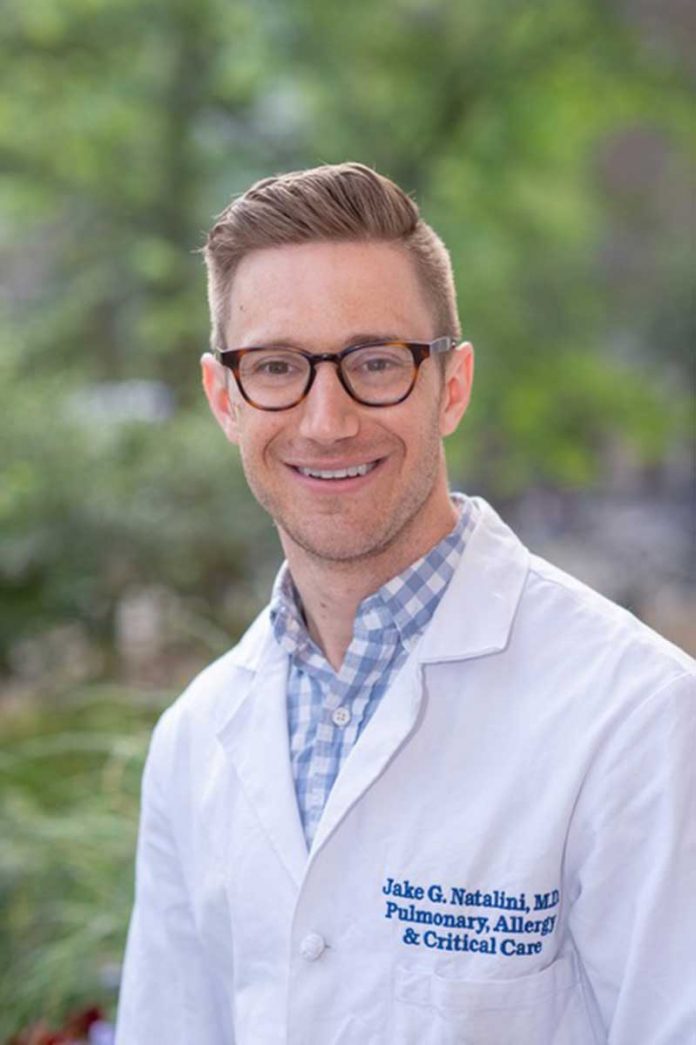
In lieu of its March 25 endorsement meeting, the members of Liberty City LGBTQ Democratic Club held a virtual meeting in which a local physician presented information on and answered questions about the new coronavirus pandemic. Because the primary has been postponed until June 2, the Democratic club is using its platform to educate LGBTQ folks on COVID-19. Endorsements will be made at a later date.
Liberty City board member Andrew McGinley served as virtual moderator for the question and answer session with Dr. Jake Natalini, physician at University of Pennsylvania in the division of Pulmonology, Allergy and Critical Care. Natalini walked the audience through information about the new coronavirus, including symptoms, prevention measures, number of known cases in and around Philadelphia and potential treatment options. He also debunked some misinformation surrounding the virus.
“This is a time of a lot of uncertainty — we’re dealing with a novel virus that we don’t really know much about, and we’re learning a lot of this as we go,” Natalini said in his opening remarks.
He began by explaining that the viral burden in COVID-19 reaches its pinnacle early. “There’s actually a period of time in some people where you have asymptomatic shedding,” he told the virtual audience. “That means that you have no symptoms of the virus but you have a higher viral load, and you’re contagious.”
He added that the viral load of the disease tends to be highest when patients are experiencing mild stages. “We actually see a decline in the viral load as the disease progresses to more severe respiratory failure,” he said. “That’s important as we think about when we initiate treatment.”
As of Tuesday, March 31, City Health Commissioner Tom Farley reported 242 newly confirmed cases of the new coronavirus in Philadelphia, bringing the total number of known cases in the city to 1,315. Now, there are confirmed cases of the virus in every zip code in Philadelphia.
Though the new coronavirus symptoms have been described as a simultaneous trio of fever, cough and shortness of breath, “this entity has only been described in about 15 percent of cases,” Natalini told viewers of the livestream.
He cited the Centers for Disease Control and Prevention’s (CDC) guidelines when discussing the point at which a person can relax isolation measures if they’ve tested positive for the virus — if they are fever-free for at least 72 hours without the use of fever-reducing medications, all other symptoms have gotten better and a minimum of seven days have gone by since symptoms first occurred. If the person in question is able to access testing, they need multiple tests, 24 hours apart, showing that the virus cannot be detected in their system, Natalini added.
Of the many questions that Liberty City members asked, one focused on what Philadelphia hospitals are experiencing in terms of patient load. “Right now, we’ve got about 1,000 cases in Pennsylvania, although we haven’t quite seen a huge number of hospital admissions yet,” Natalini told the audience.
“According to our projections, we expect for that to peak by mid-May,” he continued. “I suspect that in the next week or two we’re going to see a dramatic increase in the number of hospitalized patients, and we’re already starting to see it.”
However, he offered some optimism in terms of the City of Philadelphia’s prevention measures thus far. “I do think that Philadelphia is uniquely positioned to deal with this, perhaps more effectively than other cities that were hit earlier when there was less time to react.”
On behalf of the political endorsement group, McGinley asked Natalini, if given the chance, what he would say to President Trump right now on the subject of the new coronavirus.
“I would tell President Trump to listen to the experts and make sure the message that you’re putting forward is unified and consistent with what organizations like the NIH and CDC here are saying,” Natalini said.
Other questions included what the current demand on hospitals is in relation to rescheduled surgeries, how to differentiate between COVID-19 symptoms and seasonal allergies and how community members can support Philadelphia healthcare workers.
In addition to practicing preventive measures like social distancing and regular hand-washing, Natalini told the audience that personal protective equipment (PPE) is in high demand at the moment.
“If you or anybody you know works for a company that produces personal protective equipment, or has a handy supply of [PPE], there are websites out there that provide resources in terms of how to donate those pieces of equipment to hospitals,” he told viewers. One such resource can be found on the City of Philadelphia’s website. Liberty City will continue to update its Facebook page with resources on how to donate PPE to hospitals, McGinley told the audience.
In response to a question about concerns regarding the new coronavirus and LGBTQ communities, Natalini told the audience that he does not believe that there are any specific medical concerns, with exceptions surrounding systemic issues.
“We know that the LGBT population is inflicted with higher rates of homelessness,” he said. “We also know that we deal with higher rates of depression and higher risk for suicide. I think now as a community, it’s more important than ever for us to support each other and build each other up and to communicate openly and honestly about how we’re feeling about this, because I think that the mental health repercussions of social distancing for a long period of time are very real.”
Public health officials have said people living with HIV are not at a higher risk for severe coronavirus symptoms, unless they have low CD4 counts.
This Facebook session can be streamed in its entirety at: https://www.facebook.com/LibertyCityDems/videos/701883940548075/
Ask questions, get answers about COVID-19